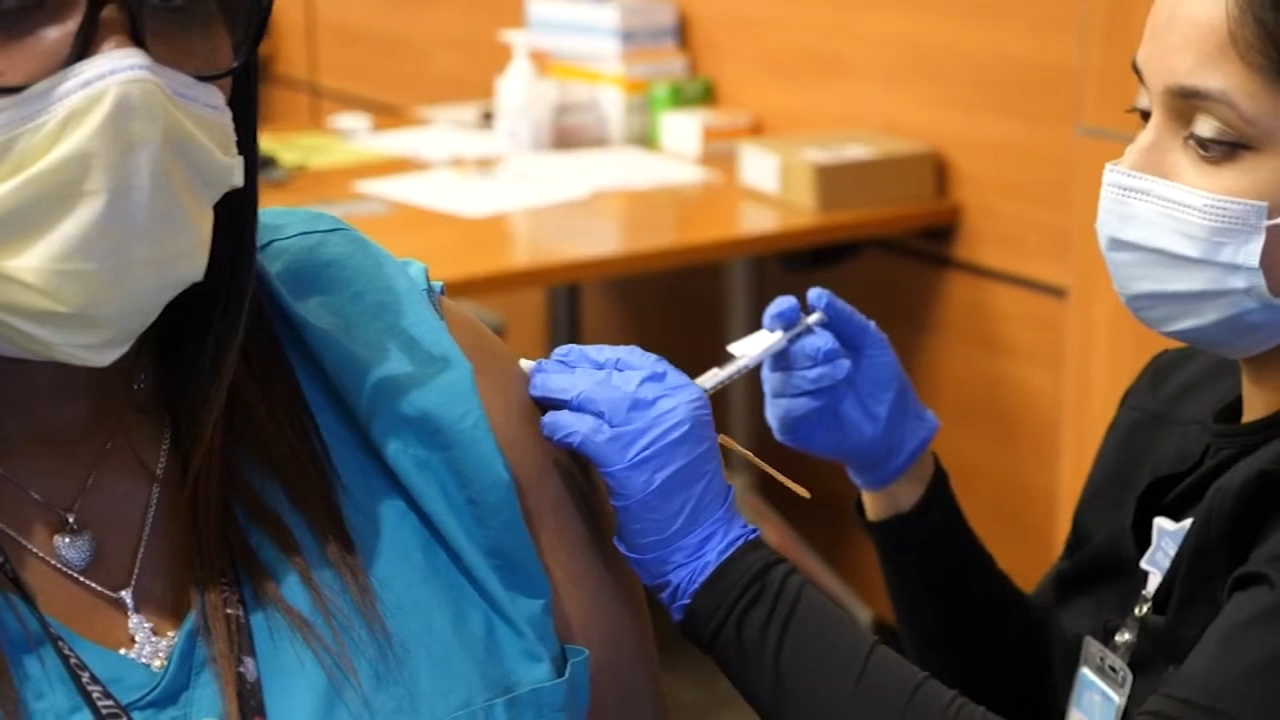Vaccine side effects: Why women are mistaking swollen lymph nodes for breast cancer
Oncologists and breast imaging experts advise women to get mammograms before the vaccine or 4 to 8 weeks after they are vaccinated

SAN FRANCISCO -- As more people are getting vaccinated, doctors are seeing an influx of women making mammogram appointments after noticing swollen lymph nodes in the arm region where they got vaccinated.
Luz Pena, a reporter with ABC7's sister station ABC7 News in San Francisco, spoke to experts who explain why you shouldn't worry if this is happening to you.
Two days after getting the second Pfizer vaccine, Julie Mazenko felt a golf-ball size lump in her armpit.
"It was kind of painful and I touched and noticed that it was full of fluid," said Mazenko, Discovery Bay resident.
RELATED | Reports of menstrual cycle changes after COVID vaccine highlight issues with clinical trials

Then she noticed a second one in her neck and a third in the other arm. One of the thoughts that crossed her mind was breast cancer.
"I do have a family history of breast cancer and I was a little concerned," said Mazenko.
Dr. Laura Esserman is the director of University of California San Francisco's Breast Care Center and says Julie is not alone. They're getting an influx of calls from women who are confusing swollen lymph nodes after the vaccine for signs of cancer.
MORE | Women more likely to experience serious side effects from COVID-19 vaccine, CDC study reveals

"I'm sure hundreds of thousands of women across the country will be affected by this for sure," said Dr. Esserman.
Most people get their vaccine in the shoulder area and it turns out we have 20-40 lymph nodes in that region. But why is the vaccine triggering them?
"The lymph nodes when they get swollen, if you have an infection, are just doing their job. In the case of a vaccine they are manufacturing the antibody for your body which is what you want," said Dr. Esserman.
Luz Pena: "Have you noticed a difference between women who have swollen lymph nodes because of the vaccine and swollen lymph nodes because of cancer?"
Dr. Esserman: "On the mammogram they will just look bigger so you can't really tell. On an exam, usually, sometimes that is obviously cancer. It is harder and more obvious."
The Society of Breast Imaging reported that 11.6% of patients who received the Moderna COVID-19 vaccine had swollen lymph nodes after the first dose, and 16% after the second dose. Women who got the Pfizer vaccine also experienced these side effects.
MORE | SoCal doctor sets the record straight on COVID-19 vaccine and fertility

"It's a phenomenon we've noticed and we are tracking it," said Dr.Bonnie Joe.
Dr. Bonnie Joe is the Chief of Breast Imaging at UCSF. She is also noticing a pattern in the images.
"It's usually the same side that the vaccine was on and generally they are higher up. So the breast cancer lymph nodes will spread from the breast from lower levels to higher levels," said Dr. Joe.
According to these doctors, the swollen nodes should be gone in between 4-10 weeks. And here's when you should worry.
"Definitely a breast lump is the concern. So any breast lump, any focal symptom or if you have bloody discharge," said Dr. Joe and added that if you are concerned after getting a vaccine, "Better to come in and play it safe and let us take a look and then we can let you know what to do next."
Dr. Joe says they have seen this with other vaccines.
"We use to see this with other vaccines too. It's just that now so many people are getting COVID vaccinations it has kind of been spiking," said Dr. Joe and added, "We just want people to know that this is a normal reaction and it's not necessarily a sign of cancer."
As for Julie, it's been six days since her vaccine.
"Not too much of a decrease yet," said Julie Mazenko.
Oncologists and breast imaging experts are advising women who have scheduled mammograms to get them before the vaccine or 4 to 8 weeks after they are fully vaccinated to get a clear picture of and avoid confusion.
Luz Pena: "Waiting those six to eight weeks if somebody does have breast cancer could that be detrimental to their health?"
Dr. Esserman: "Six to eight weeks is not going to make a difference one way or the other. Today what we understand about breast cancer is that it is not one disease it's many different kinds and some are every slow growing and some are faster growing."
Having trouble loading the tracker above? Click here to open it in a new window.










